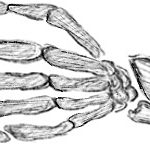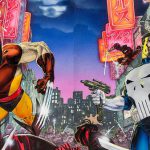We were in bed, a very nice place to be. It was December twenty-second and glancing out the window showed the snow swirling about our warm house. I carefully worked my fingers down her back, lightly massaging her spine.
“Mmm,” she said.
“I think so too,” I replied.
Megan rolled on her side and gave me a kiss and touched my ear in that way she had.
“Did I ever tell you why Christmas is so special to me?”
“Don’t think so.”
“Well,” she said, pulling me close, “I realized the other day that it’s twenty years ago tomorrow that Mom and Dad and I had our adventure. I was pretty young so some of it’s hazy, but on the twenty-third of December, Mom and Dad and I went downtown to see the Nutcracker Suite. And it was great. I clearly remember all the dancing and everything and what I wore and what Mom wore. It was a very beautiful evening. We had parked a ways away so, after the show, we walked to the far corner of the lot to get the car.”
“What kind of car did your Dad have?”
“How should I know? Ask him when we see him. Carefully, though. They don’t like talking about that evening. Anyway, Dad was unlocking the car when a really scary man struck him to the ground. The guy must’ve been hiding behind another car or something. Mother screamed that piercing howl of hers and I just looked. The man was grimy. I remember that but I’d never be able to tell you anything else about his looks. His clothes were ratty. And he smelled. When I think about it I can still smell it.”
She paused and I pulled her closer. Her leg moved on top of mine. “So what did you do?” I asked.
“It was very odd. Mom kicked him. She hadn’t taken kindly to her family being threatened. But the bum lashed out with a knife and ripped her coat open.”
“Is that where she got that scar on her arm?”
“That’s the one,” Megan said. “I didn’t know what was going to happen. Mom and Dad were both hurt and I was really scared. But a guy came from behind and attacked the guy, knocking him down.”
“Who was your defender?”
“I never found out. He just smacked the guy and then ran off. I sort of always thought of him as an angel. That’s what Mom always said. That an angel of God came down and saved us.”
“That does sound like your Mom’s type of Christian rationalization.”
“Don’t be cynical. It was a great explanation for a little girl. Besides, all I care about is that I was around to be with you.”
My ears started turning red. So I kissed her. What do you say to something like that? It was too wonderful a compliment to ruin with a pathetic “thank-you” or something. So I just kept kissing her.
A little later I asked: “Didn’t your rescuer give first aid? Or call the cops?” I asked.
“Not that I recall. He just sort of arrived and left.”
“What did he look like?”
“Well-dressed, I guess. Maybe someone who went to the show.”
“Too bad we’ll never know. I’d like to thank the guy.”
The next day was the twenty-third and I finished work and went shopping. Megan knew I was going to be late because I’m that last minute sort of character. Plus I’ve always done my shopping on the twenty-third by myself. I treat myself to a nice dinner somewhere, plot out whatI want to get people, make my Santa Claus list and burst into the throngs of shoppers. There’s a camaraderie amongst The Disorganized. We hustle and bustle and enjoy it thoroughly.
For no really logical reason, I chose Mexican and made my list. It was big. So I finished up and headed south toward the Eaton Centre. There was wet snow about so I made some snowballs and threw them at walls and such. People looked at me, in my business suit and coat, and wondered how a mature man could be so juvenile. It was easy, I wanted to tell them.
I went into the big record stores and took care of about half my shopping list. So with an armful of disks under my arm, I tried to cross Dundas Street at Yonge. It was a Fiero. Red. I’m absolutely positive. It flashed from around the street car, unaware that the light was red and I was in the way. I tried to twist out of the way, but it didn’t seem likely I’d succeed. The car struck, I remember letting go of my records, but the impact wasn’t what I expected. There was a spongy sort of sensation followed by blackness.
I came to my senses and found I was sitting flat on my butt in the middle of the Dundas Street.
“Hey, man, are you all right?”
“Well,” I said, “I guess so. Did the car get away?”
“I didn’t see any car; I just saw you fall on yer bum.”
I looked up at my inquisitor and found a hippie. Which was odd. He had the effect down really well. The hair, the tie-dye jeans and bandanna were spot on. His winter jacket had a peace symbol inscribed on it. The hippie proffered a hand and helped me up from the pavement.
“Thanks muchly,” I said. “Merry Christmas.”
“No sweat man. Be cool.”
I wondered what had happened to the Fiero. I wondered where my records had gone. Surely I wasn’t unconscious long enough for someone to steal them?
I finished crossing the street and tried to get some feeling of orientation. It went away when I saw a shoe-shine boy. I had not seen one in many, many years. I dimly recalled that they went out of style after two men sexually assaulted and murdered a shoe shine boy on the roof of a body rub parlour. Those particular fronts for prostitution had also gone they way of the dodo after that scandal. I started blinking a lot. The kid looked at me oddly as I was staring at him.
“Wanna shine or not?”
“Ah, no, thank you.” And I walked toward where the entrance of the Eaton Centre was supposed to be. It was gone. I whimpered, looked back at the street, and got a horrible shock. This was Yonge and Dundas of old. Some buildings I recognized and some I identified as having been demolished. Now they stood, inexplicably intact.
I turned around the corner and hastily walked south. A small store was open and I entered it and grabbed a newspaper. December 23 1968. I coughed. This was incredible. “How the hell did I get here?”
The shopkeeper looked at me. “You walked in, sir.”
“Thank you, yes,” I replied.
But it wasn’t the “here” that was the problem, it was the “when.” It was 1968, exactly twenty years from when I was a few minutes ago. I realized how odd that sounded, but subjective and objective time had just got somewhat more confusing.
“Would you like to buy the paper, sir?”
The shopkeeper was looking at my vice grip on the Daily Star with some concern.
“Certainly,” I said. I reached into my pocket to pay the dime (!) price. I glanced at the year on the coin: 1986. The ten cent piece had been the same shape for as long as I could recall, so hopefully the date wouldn’t be observed.
As I left the store the impracticalities of my situation became apparent. My paper money was useless as I knew the mint had re-issued all the currency between ’68 and ’88. My credit cards were useless because I was positive that if Visa existed, it was called “Chargex” and Mastercard was “Mastercharge.” I was walking south toward Queen Street, scanning the paper.
“U.S. moon-men ‘feeling better’ after touch of flu.” The Apollo 8 was doing a circuit of the moon. There was a photo of an astronaut. Somewhere else I noticed that Richard M. Nixon had been recently elected President of the U.S. I laughed.
I figured if I stole some money and got to a bookie and a stock broker I’d be rich in a month. I was quite good at sports trivia. Who won the Stanley Cup in ’69? Why the Canadians of course. They beat St. Louis, the expansion club. I didn’t remember the score, but naturally all I had to do was bet on the game a zillion times. Plus, I’d know a few companies to invest in. The microcomputer market didn’t even exist yet.
Then I started to cry. If I were truly stuck here, in twenty years I was going to return from my December twenty-third shopping trip a much older, greying man. I had reached Queen and Yonge. The Simpsons Department store had their famous windows, with Christmas scenes, puppets and Santa Claus. I was openly sobbing. Mom had brought me here when I was a kid.
“Sir, sir, what can be so sad at this time of year?”
It was a lady from the Salvation Army who had stepped away from her bell-ringing to talk to me.
“I’m lost,” I sobbed.
She must have been perplexed, but my vision was too blurry to see.
“Where is it that you live?”
“1988,” I muttered. I was getting mad at myself now for crying. I wiped away the tears. The Salvation Army lady was clearly bewildered. “I apologize,” I said. “I’m in love with a younger woman.”
“Oh my,” she said, “it can’t be that bad.”
“Oh yes it can; she’s five.” And I walked farther south.
After having a good solid emotional outburst, I was ready for analytical thought. I figured that trying to get back to 1988 the same way I came was clearly dubious. I felt it unwise to experiment with throwing myself in front of red ’68 Corvettes. If I accepted the fact that if I were to be in Toronto of 1968 for a prolonged period, I had better review what was happening. I found a place to sit with my paper and started to read. I pored over that paper more avidly than I had read any other newspaper in my life. The material was fascinating. A Hamilton policeman had been slain a few days earlier. The former Prime Minister Pearson envisioned war happening only through an accident. Gary Lautens had been writing a column in ’68 and was making fun of hijackings to Cuba. Ann Landers was advising that the fact a guest at a party had undressed was the hostess’ own fault. A person renting an apartment was saying that despite the fact his rent went from $145 to $180, there was no need for rent controls.
“Oil Export Crisis Feared.” I laughed. Wait until 1973, I thought.
According to an ad, you could hire a new president for your company at $25,000 a year.
A ’67 Mustang sold for $2399.
Bob Hope was in Viet Nam, saying that he had been going to stay in the States for Christmas, but there was too much violence. Same jokes.
The Leafs won 8-3. Flat out impossible.
2001 A Space Odyssey was playing at The Glendale Theatre that was to be turned into a car dealership. Romeo and Juliet, Chitty Chitty Bang Bang, Dr. Zhivago and Thunderball were playing elsewhere.
I nearly screamed aloud when I saw the advertisement for The Nutcracker Suite. I remembered Megan’s story of “last night” and wondered. She did say the twenty-third, didn’t she? And was it twenty years ago exactly? I was struggling to recall. It was infuriating. I could recall the Stanley Cup champions of 1969, but I couldn’t recall Megan’s story. Of course it was twenty years ago; she was five and I did remember that she was twenty-five when I last saw her.
The paper gave the location of the concert. It had already started and was probably close to ending. So what was I to do? It would be interesting to see the altercation. Seeing I already knew the outcome, I could have my wish of thanking the anonymous chap who saved my sweetheart-to-be’s life. I had nothing better to do, so I headed farther south. I wish Megan had remembered what kind of car her Dad had driven. That I would have remembered.
I found the main parking lot, but Megan had said that they were far away. Was it the main lot? I looked around. The scenario had to involve darkness. Megan’s Dad would have avoided a threatening figure if he could have seen one. So I scanned for a dark far corner of the lot. I saw one that looked promising and walked to the main entrance and very politely asked an usher when the show was to end.
“In about ten minutes sir.”
“Thank you.” I headed out to the carpark. I was tempted to look for dangerous figures, but I might scare the guy off and inadvertently affect the scheme of things. I had to observe only. Otherwise, how would Megan’s Mom get her scar? And, if the incident never happened, Megan would not have the same story to tell me in bed.
When walking by the parked cars, I noticed a lot of unlocked car doors. I opened the door to an old Lincoln and sat in the driver’s seat and admired all the leather and absolutely absurd amount of metal in the dashboard.
I pondered the law of conservation of mass and energy. It had occurred to me that a small boy with my name was bopping about Toronto somewhere right now. One of us was big and the other small, but some of the body parts had to be made up of the same matter. This became too complicated, so my mind quickly moved to the question of what I was going to say to the owner of the car when he arrived.
I saw that people were leaving the theatre, so I got out of the car and receded into the shadows. A couple of minutes passed and then I saw them. Megan was so cute. She was all bundled up in a blue winter coat and had, of all things, a muff. I tried to remember if Megan, at her more mature age, had mentioned it. I silently matched their movements, keeping out of sight.
Then they stopped and Megan’s father unlocked the car. It was a huge Charger. I was jealous. They didn’t make cars like that anymore.
But there was a drunk man lying on the ground. He had puked on the car. Megan’s Dad, a more robust figure in ’68 than the man I knew in ’88, kicked the drunk rather hard, cursing. Megan’s mother was sheltering her daughter, explaining why I was never told this part.
With amazing speed the drunk rose from the ground and grappled with Megan’s Dad. They fell against the car and the drunk kept shoving. They slid off the car and both hit the ground. The drunk rose and Dad did not. Megan had not underestimated her mother’s scream. It stung. She then firmly planted her foot in the attacker’s groin. What a Christian woman.
I wondered how this guy was going to compose himself to produce a knife but, to my surprise, he seemed not overly bothered by the kick. The attacker produced a blade and ripped deep into her coat. Her second scream was more piercing than the first.
I was losing my sense of detachment in the whole situation because Megan was now left face-to-face with the drunk. She was crying, calling out mommy, mommy, mommy. My heart was breaking. Where was the rescuer? It was his cue. I looked around and there was no one nearby but me.
I suddenly felt very stupid. Accidental time travel? What a crock. I was here for a reason. There was some balance I had to keep. I dashed out from the darkness and grabbed the attacker. He was about to use his knife on Megan. My heart was pounding. It was as if I was in an auto-pilot mode. I was outside my body, watching myself leap out at the drunk. I grabbed him by the hair and slammed his head against the Charger. It was quick. He slumped to the ground, leaving a rather impressive dent in the car. I doubt he knew what hit him.
Turning toward Megan I saw a crying, beautiful little girl who I loved intensely. I bent over and gave her a big smack on the cheek and whispered in her ear: “Everything’s going to be O.K.”
Other patrons of the arts were rushing toward the scene. To keep with the story Megan had told me, I ran away. People shouted after me to wait, but the questions would be impossible and I knew the wounded would live.
I ran for a long time. There was a combination of shock and panic shooting through my body like lightning. I’d never hit anyone before in my life.
Running was pleasant because the city looked more normal than while walking. Less time to absorb the differences, I supposed. It was at King Street that the car hit me. I was running against a light and a red Mustang, as best as I could recall, seemed to slam right into me. It was a relief really, because I didn’t think I could cope with living 1968 to 1988 all over again, even with my knowledge of hockey stats.
When I woke in the hospital, a wonderfully mature Megan was peering at me. She was weepy. The arm that wasn’t broken reached out and grabbed her, pulling her toward me. I kissed her.
“I’m so glad you’re here. Everything’s going to be O.K.”
I kissed her again and asked what date it was.
“It’s Christmas Eve; you’ve been out cold for a day.”
“What year?” I asked.
She paused, probably wondering what kind of hit on the head I’d received. “1988,” she whispered.
“How time flies,” I said.









